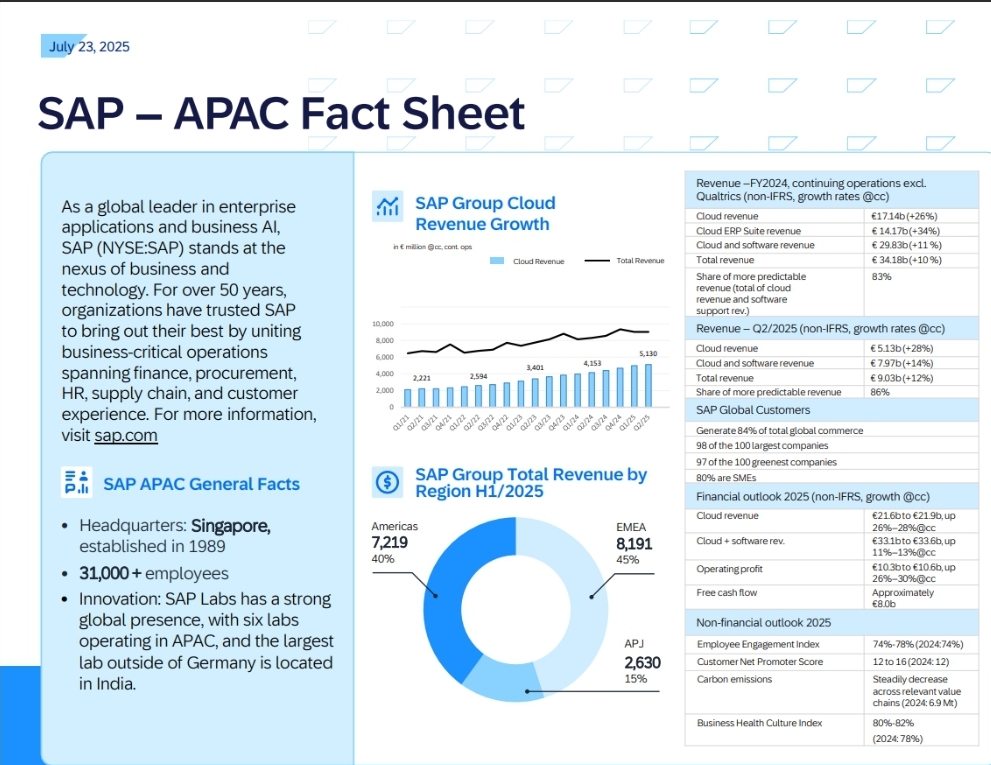SAP’s Sovereign Cloud Launch in India: A Customer Experience Game-Changer for Digital Trust
For organizations navigating India’s complex regulatory landscape, trust has become the new customer experience currency. Additionally, SAP’s latest Sovereign Cloud initiative is positioning itself as the definitive solution.
Today’s regulated industries face an unprecedented challenge. Consequently, they must balance innovation with stringent compliance requirements. Meanwhile, customers demand seamless digital experiences that don’t compromise data security. Furthermore, SAP’s new Sovereign Cloud in India directly addresses this tension.
The Trust Imperative in Digital Customer Experience
Trust fundamentally drives customer loyalty in regulated sectors. Moreover, research indicates that 73% of consumers consider experience crucial in purchasing decisions. Similarly, regulated industries face unique CX challenges where data sovereignty directly impacts customer confidence.
When customers engage with banks, healthcare providers, or government services, they expect their data to remain secure. Additionally, they want transparent control over information usage. Therefore, SAP’s compliance with India’s National Information Security Policy & Guidelines (NISPG) becomes essential.
The NISPG framework encompasses comprehensive security measures for government and public sector organizations. Furthermore, it addresses information protection throughout its lifecycle, including creation, storage, processing, and transmission. Consequently, SAP’s alignment with these guidelines establishes foundational trust for customer interactions.
Four Dimensions of Sovereign Customer Experience
SAP’s approach centers on four sovereignty dimensions: data, operational, technical, and legal control. Each dimension directly impacts customer experience delivery.
Data sovereignty ensures customer information remains within Indian borders. Therefore, organizations can provide transparent data handling practices. Consequently, customers gain confidence in their privacy protection.
Operational sovereignty empowers Indian organizations to maintain complete control over their systems. Meanwhile, this autonomy enables rapid customer service responses. Additionally, local decision-making accelerates problem resolution.
Technical sovereignty provides infrastructure independence from foreign dependencies. Subsequently, organizations can customize solutions for Indian customer preferences. Moreover, they can implement culturally relevant engagement strategies.
Legal sovereignty ensures compliance with Indian regulations throughout customer interactions. Therefore, organizations can offer transparent legal protections. Consequently, customers understand their rights clearly.
Enterprise AI’s Role in Regulatory Customer Experience
SAP’s Business AI integration within the Sovereign Cloud creates unprecedented CX opportunities. Furthermore, AI-driven personalization can operate within strict compliance frameworks. Additionally, predictive analytics enhance customer service while maintaining data sovereignty.
Enterprise AI applications show remarkable results. Moreover, organizations using AI report 17% higher customer satisfaction. Similarly, AI automation reduces customer service costs by 30%. Furthermore, AI-powered systems handle 80% more customer inquiries efficiently.
The SAP Business AI Feature Catalog provides structured exploration of AI capabilities. Additionally, the Estimator tool helps organizations assess potential CX value. Therefore, regulated industries can implement AI strategically while maintaining sovereignty.
AI-enhanced customer service demonstrates clear ROI benefits. Furthermore, mature AI adopters achieve 35% cost reduction in operations. Similarly, they experience 32% revenue increases through improved customer experiences. Additionally, AI-driven personalization increases customer lifetime value significantly.
Transforming Regulated Industry Customer Journeys
Regulated industries require specialized CX approaches that balance innovation with compliance. Moreover, SAP’s Sovereign Cloud enables this delicate balance through compliance-first design. Additionally, organizations can deliver personalized experiences without compromising security.
The customer journey in regulated sectors spans multiple touchpoints requiring consistent security. Furthermore, each interaction must demonstrate clear data protection measures. Additionally, transparency builds customer confidence throughout the journey.
Financial services particularly benefit from sovereign cloud architectures. Moreover, banks can implement AI-driven fraud detection while maintaining data locality. Similarly, insurance providers can enhance claim processing through predictive analytics. Additionally, NBFCs can demonstrate fair lending practices through transparent data handling.
Healthcare organizations gain significant advantages through sovereign cloud adoption. Furthermore, patient data remains within Indian borders while enabling AI-powered diagnostics. Additionally, electronic health records maintain compliance with local regulations. Moreover, telemedicine services can scale confidently within sovereign boundaries.
The Bengaluru Innovation Hub’s CX Impact
SAP Labs India Innovation Park represents a strategic CX investment in local capabilities. Furthermore, the €194 million facility houses 15,000 professionals focused on customer-centric innovation. Additionally, the location near Bengaluru International Airport facilitates global collaboration while maintaining local control.
The Innovation Park’s Secure Operational Facility meets stringent national security requirements. Moreover, it serves as a strategic hub for compliance assurance and co-creation. Therefore, Indian customers can collaborate directly on sovereign solutions. Additionally, this proximity enhances understanding of local CX preferences.
Research and development capabilities at the facility focus on AI-driven customer solutions. Furthermore, teams develop Joule’s agentic AI capabilities specifically for enterprise applications. Additionally, customer experience centers enable real-time feedback incorporation. Moreover, startup incubation hubs foster innovative CX solutions.
Measuring Sovereign CX Success
Success metrics for sovereign customer experience extend beyond traditional satisfaction scores. Furthermore, compliance adherence becomes a crucial CX indicator. Additionally, data residency transparency demonstrates customer trust building.
Customer trust metrics include data handling transparency scores and privacy control effectiveness. Moreover, compliance audit results directly impact customer confidence. Additionally, response time improvements within sovereign boundaries demonstrate operational efficiency.
Financial impact measurements encompass customer acquisition cost reduction and lifetime value increases. Furthermore, retention improvements in regulated sectors indicate successful sovereign positioning. Additionally, referral rates among compliance-conscious customers validate the approach.
Operational efficiency gains include reduced compliance-related customer service inquiries. Moreover, faster resolution times within sovereign boundaries improve satisfaction. Additionally, proactive compliance notifications enhance customer confidence.
Competitive Advantages Through Digital Sovereignty
Digital sovereignty creates distinctive competitive positioning in regulated markets. Furthermore, organizations can differentiate through superior data protection practices. Additionally, local control demonstrates commitment to Indian customer interests.
Market research indicates that 70% of Indian organizations still store data on foreign servers. Meanwhile, this creates opportunities for sovereign-positioned competitors. Therefore, early adopters of sovereign cloud solutions gain first-mover advantages.
Customer preference trends increasingly favor locally controlled services. Moreover, regulatory pressures amplify these preferences. Additionally, sovereign positioning attracts customers seeking compliance-assured experiences. Furthermore, transparent data governance builds stronger customer relationships.
The competitive landscape shows clear momentum toward sovereignty requirements. Additionally, global tech companies recognize this trend through sovereign cloud investments. Moreover, Indian organizations prioritize self-reliant digital strategies. Therefore, sovereign-enabled CX becomes a crucial differentiator.
Future CX Implications of Sovereign Cloud Architecture
Sovereign cloud architecture enables advanced CX capabilities previously constrained by compliance concerns. Furthermore, AI-powered personalization can operate freely within sovereign boundaries. Additionally, predictive analytics enhance customer service without external dependencies.
Edge computing capabilities within sovereign infrastructure reduce latency for customer-facing applications. Moreover, local data processing enables real-time personalization. Additionally, distributed architectures support scalable customer engagement platforms.
Integration possibilities expand through sovereign API ecosystems. Furthermore, organizations can connect multiple sovereign services seamlessly. Additionally, data sharing between compliant organizations enhances collective CX capabilities. Moreover, industry-specific solutions emerge from collaborative sovereign development.
Innovation acceleration results from reduced compliance friction. Therefore, organizations can iterate customer solutions faster. Additionally, local development teams understand cultural nuances better. Furthermore, regulatory alignment eliminates delays in CX feature deployment.

Strategic Implementation Considerations
Organizations implementing sovereign CX strategies must balance multiple factors carefully. Moreover, technology integration requires comprehensive planning. Additionally, change management ensures employee adoption of new sovereign processes.
Customer communication about sovereignty benefits requires careful messaging. Furthermore, transparency about data handling builds trust without creating complexity. Additionally, education about sovereignty advantages enhances customer appreciation. Moreover, clear privacy controls empower customer confidence.
Training programs ensure employees understand sovereignty implications for customer interactions. Furthermore, compliance protocols must integrate seamlessly with CX processes. Additionally, monitoring systems track sovereignty adherence across customer touchpoints. Moreover, regular audits validate ongoing compliance effectiveness.
Investment considerations include infrastructure costs versus long-term CX benefits. Furthermore, sovereign positioning may command premium pricing in regulated markets. Additionally, customer acquisition costs may decrease through trust-based differentiation. Moreover, retention improvements justify sovereignty investments.
The convergence of digital sovereignty and customer experience represents a fundamental shift in how regulated industries approach customer relationships. SAP’s Sovereign Cloud in India positions organizations to lead this transformation by combining technological innovation with regulatory compliance. As customers increasingly value data control and transparency, sovereign-enabled CX becomes essential for competitive success.
Through strategic implementation of sovereign cloud architecture, organizations can deliver exceptional customer experiences while meeting stringent regulatory requirements. This approach transforms compliance from a constraint into a competitive advantage, enabling deeper customer trust and stronger business relationships in India’s rapidly evolving digital landscape.

